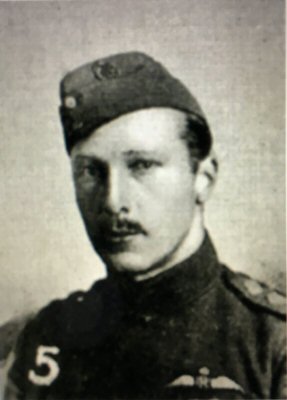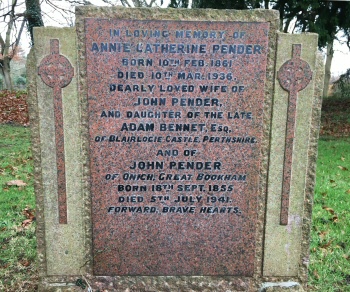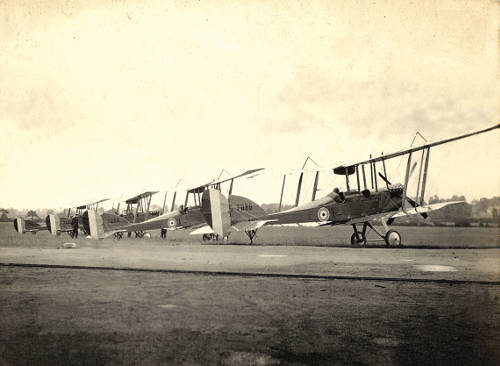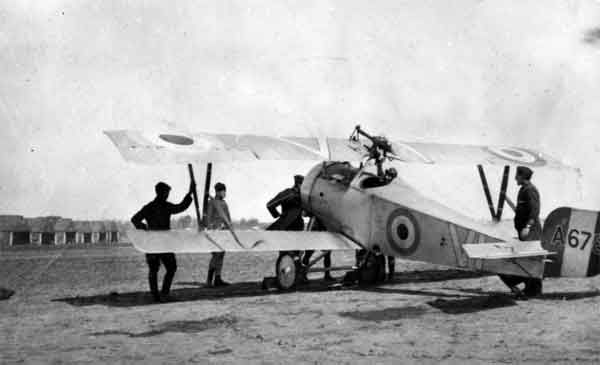Gt Bookham War
Memorials - WWI - Captain William Gordon Pender
40th Squadron Royal Flying Corps
CWGC
record
Captain
PENDER, WILLIAM GORDON M.C.
Died 15/08/1917
Aged 30
40th Sqdn. Royal Flying Corps
Eldest son of John and Annie Catherine Bennet Pender, of Onich, Great
Bookham, Surrey.
William Gordon Pender was born on 18
November 1886 in Humbie, East Lothian to John Pender, a farmer, and his
wife Annie. In the 1891Census they were living at Chesterhill Farm House,
Humbie. By the 1901 Census the family had moved to England and were at
Bridge End Farm, Ockham, Surrey, still farming.
Humbie is a hamlet and rural parish in East
Lothian, Scotland. It lies in the south-east of the county, approximately
10 miles south-west of Haddington and 15 miles south-east of Edinburgh1.
He was educated at the prestigious Dollar
Academy in Clackmannanshire. Local research2 in
that area yields the first summary of his life:
Eldest son of John and Annie Catherine Bennet Pender, of Onich,
Great Bookham, Surrey; formerly of Dollar. Educated at Dollar
Academy. He left in 1904. He studied engineering in Dundee before
going to Rhodesia in 1909. Captain Royal Flying Corps 40th
Squadron. He acted as an instructor at home for some months and
returned to France early in 1917. Awards: Military Cross, 1917,
for flying at a height of 500 feet three times over his
opposition’s trenches, enabling his observer to gain information.
Died 15/08/1917, aged 30. France ARRAS FLYING SERVICES MEMORIAL.
Also commemorated at Dollar Academy. Photograph: Dollar
Magazine 1919, p91. |

|
A Mr WG Pender departed Southampton on 1 May
1909 on the Union Castle Line's vessel Gascon, bound for
Cape Town.3
A William G Pender departed Durban, South Africa on 9 December 1914 on the
Union Castle Line's vessel Saxon via Plymouth to London.3
His Aviator's Certificate No.1668 (Maurice
Farman Biplane, Military School, Brooklands) was awarded on 30
August 1915.
He was posted to 15 Squadron which was
equipped with Royal Aircraft Factory B.E.2 (Blériot Experimental)
single-engine two-seat biplanes.
from FOR VALOUR: CANADIANS AND THE
VICTORIA CROSS IN THE GREAT WAR 4, on
Canadian WWI hero 'Billy' Barker5, who was awarded the VC, DSO
and Bar, MC and two Bars
The British attempted one final attack
before the winter, and on November 13 [1916] the Battle of the Ancre began
in thick mist, which hampered the artillery spotting of No. 15 Squadron.
In the following days Barker, whose pilot was Capt. W.G. Pender, helped in
the attempted contact of Scottish troops isolated in Frankfurt Trench near
Redan Ridge, following the British attack of November 13. Unfortunately,
despite brave rescue attempts and stubborn resistance by these men of
16/Highland Light Infantry, they were eventually attacked and overwhelmed.
In addition, again piloted by Capt. Pender, over Y Ravine, Beaumont Hamel,
Barker "engaged large numbers of infantry in trenches with Lewis gun fire,
and reported their position to the artillery.”
The Battle of Ancre began on 13 November
1916, and 15 Squadron was engaged in artillery spotting over 'Y Ravine',
Beaumont Hamel.
Pender's Observer, according to
Barker
VC by Wayne Ralph, Grub Street (1999), Barker reported:-
"
..I flew low & got the required information & also got 62
m[achine] gun holes through our plane. However, I am as lucky as
ever & was not touched but we were not to get away untouched
for just as we were leaving several m.g.s started & I felt
the plane give a sudden lurch. Instinctively, I took the
controls & upon looking around saw the pilot was mighty
pale. he signalled that he was hit but seemed all right at the
time. However, a few minutes later he fainted so I took control
and landed the plane on the aerodrome without crashing. In the
meantime I had called for a doctor by wireless & we soon had
medical aid.
My plane is fitted with dual controls & I can fly fine..." [Some
Be2d versions were fitted with dual control.]
Flight JANUARY 18, 1917.
HONOURS FOR THE R.F.C.
2nd Lt. (Temp. Capt.) WILLIAM G. PENDER, S.R. [Special Reserve] and R.F.C.
For conspicuous gallantry in action. On three occasions he flew over the
enemy's trenches for long periods at a height of 500 ft., enabling his
observer to gain valuable information.
and on the same page:
Temp. 2nd Lt. WILLIAM G. BARKER, Gen. List and R.F.C.
For conspicuous gallantry in action. He flew at a height of 500 ft. over
the enemy's lines, and brought back most valuable information. On another
occasion, after driving off two hostile machines, he carried out an
excellent photographic reconnaissance.
Having recovered from his wounds, in the
period between the end of 1916 and his death in August 1917 William Pender
was eventually posted to 40 Squadron RFC.
The family of course were anxious for
information. This request appeared in The Aeroplane, 20 March
1918:-
'Capt. W. G. Pender, M.C., R.F.C., was
reported missing on Aug, 15th, 1917. Will friends of prisoners of war in
Germany (especially R.F.C. prisoners of war) request information of the
above-mentioned officer for his mother, Mrs. Pender, Onich, Bookham,
Surrey, who will be most grateful for any particulars whatever?'
However it was confirmed that he had been
killed. His body was never recovered or if it was, never identified:
Obituary in Flight
'CAPT. W. G. PENDER, M.C., R.F.C., who was reported missing on August
15th, 1917, and has now been officially reported as killed on that date,
was the eldest son of Mr. and Mrs. John Pender, of Onich, Great Bookham,
Surrey. Born in 1886, he was educated at Dollar Academy,
[Clackmannanshire] Scotland, where he distinguished himself as an athlete,
being in the first XV. in 1903-1904 and 1904-1905. His play as
three-quarter back was unexcelled in Scottish school football in these
years. He was also champion long-distance runner in 1904 and 1905.
On leaving school he studied engineering in Dundee, and in 1909 received
the offer of an appointment in Rhodesia.
On the outbreak of war he returned to
England, and obtained his commission in the R.F.C. He quickly gained his
wings, and saw much active service. He was noted as an extremely skilful
pilot, and was awarded the Military Cross for conspicuous bravery in
connection with the battle of the Somme.
He was wounded in July, 1916, but insisted
on remaining in hospital in France in order to rejoin his squadron at the
earliest possible moment.
A
very similar report appeared in the Surrey Advertiser on 1 June
1918
CAPTAIN PENDER'S FATE
Captain W.G. Pender M.C., R.F.C who was reported missing on August 15,
1917, has now been officially reported as killed on that date. Born in
1886 he was the eldest son of Mr and Mrs John Pender of, of Onich, Great
Bookham. Educated at Dollar Academy, Scotland, he distinguished himself
as an athlete. On leaving school he studied engineering in Dundee, and
in 1909 received the offer of of an appointment in Rhodesia. On the
outbreak of war he returned to England, and gained his commission in the
Royal Flying Corps. He quickly gained his “wings“ and saw much active
service. He was noted as an extremely skilful pilot, and was awarded the
Military Cross for conspicuous bravery in connection with the Battle of
the Somme. He was wounded in July, 1916, but insisted on remaining in
hospital in France in order to rejoin his squadron at the earliest
possible moment.6
As well as his commemoration on the War
Memorial Cross and plaque at St Nicolas, Great Bookham, he is commemorated
on the
Arras
Flying Services Memorial, Pas-de-Calais, France for those aviators
who have no known grave.
Probate was granted to his mother: Killed in
action, 15 August 1917 – probate to mother Annie Catherine Pender, effects
£648:3:8.
Had he lived he would no doubt have tried to
be at the wedding of his brother:
Surrey Advertiser 1 December 1917 the
engagement is announced of Captain I?MM Pender, Seaforth Highlanders, and
RFC, youngest son of Mr and Mrs John Pender, Onich, Great Bookham, and
Lorna Ledlie, younger daughter of the late Mr WP Smith and of Mrs Smith,
of Ravenswood East, Saint Kilda, Melbourne Australia. The Scotsman
11 January 1918 reported that the marriage took place at St Mary Abbots
Church, Kensington on 27 December 1917.
His father John died on 6th July 1941 aged 85.
His mother Annie died on 10th March 1936.
The Burial Register for All Saints Little Bookham reads:
203 [grave] 417 [entry] - Annie Catherine Pender - 'Onich' Great
Bookham - [burial] 11 March 1936 - 75 - Arthur L Drinkwater,
Rector
203 [grave] 444 [entry] - John Pender - Great Bookham - [burial] 8
July 1941- 85 - Arthur L Drinkwater, Rector
The photo of their headstone was taken by the editor in the
graveyard of All Saints Little Bookham on 10th February, 2018.
[Some other sources state that John and Annie are buried
elsewhere.] |

|
1. Wikipedia
with thanks to Brian Bouchard for much of the
background information: other contributors Frank Haslam and Bill Whitman
page added 9 Feb 2018: updated 10 Feb 2018





